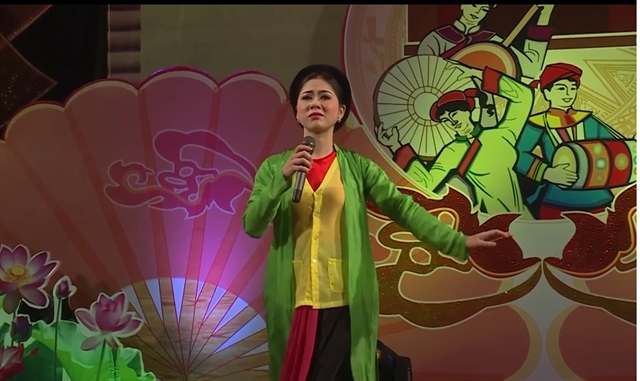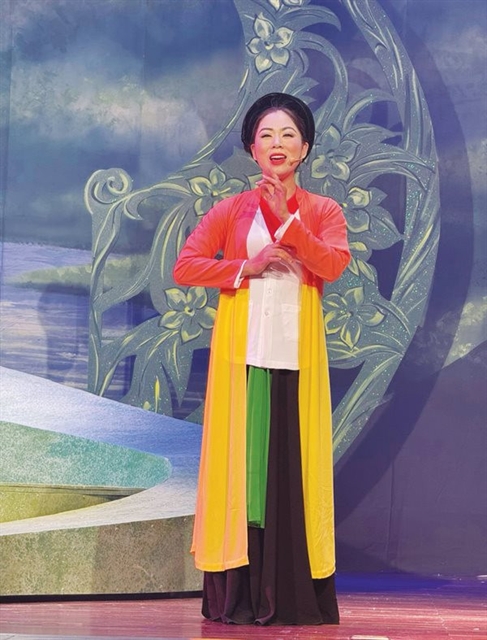 Sunday/Weekend
Sunday/Weekend

 |
| Hà Thị Thảo determines to continue her devotion to 'chèo' and to fulfill the trust placed in her by the previous generations of 'chèo' performers. — Photo baomoi.com |
Hà Thị Thảo is a celebrated artist at the Việt Nam Chèo (Northern traditional opera) Theatre. Born in 1991 in Then Village, Thái Đào Commune, Lạng Giang District, Bắc Giang Province, Thảo has steadily made a name for herself in the world of chèo. With her sweet voice and strong acting abilities, she has won two gold and two silver medals at prestigious national stage festivals, affirming her talent. Mai Đình talks to Thảo about her career and the passion that drives her.
Inner Sanctum: You went to Hà Nội to study chèo at the age of 16. What brought a girl from a mountainous region to the capital so early?
I was born in Then Village, a small village with an artistic tradition in Bắc Giang Province. My father also loves chèo, so when he knew that the Việt Nam Chèo Theatre was recruiting, he immediately encouraged me to compete. When I applied, I knew nothing about chèo art and only sang one or two songs so the recruiters could assess my voice. After passing the preliminary round, the instructors at the theatre taught me chèo for the next round of competition.
After finishing secondary school, I went to Hà Nội to study cultural supplementary courses at the Circus and Variety Arts College and to learn chèo at the Việt Nam Chèo Theatre. Step by step, I came to love chèo art. If I say "I love this profession very much," it may sound overconfident, but it is true. The art of chèo always moves me, especially when I hear the music and immerse myself in my roles.
Inner Sanctum: You often play lead roles. Looking back, which one do you like best?
At the theatre, I often portray female leads with various personalities and destinies. To perform well on stage, each actor must thoroughly understand their character. I once played Thị Kính in Quan Âm Thị Kính (Thị Kính, the Goddess of Compassion), a gentle woman who has strong feeling of sympathy but suffers many injustices.
However, I also enjoy complex roles like Thiệt Thê in the play named Nàng Thiệt Thê (Lady Thiệt Thê), which requires portraying a wide range of emotions. While her husband is a man of loyalty and dedication to pursuing the imperial examinations, Thiệt Thê is innocent and lovely but also flawed in her desire for immediate material benefits.
Nàng Thiệt Thê brought the audience refreshing, profound, and meaningful laughter. My portrayal required constant shifts in facial expressions, a stark contrast to the usually consistent mood of a typical female lead role.
Most recently, I played the female lead in Lullaby of Love, a new work by the Việt Nam Chèo Theatre. Compared to Thiệt Thê, the role of Hạ Vân in Lullaby of Love is gentler in psychological development.
However, the lullabies she sings are a way to heal the soul, and the moments she sings from the heart are the moments she heals her wounds.
I always strive to preserve the artistic standards of chèo passed down by our ancestors.
 |
| Hà Thị Thảo is a celebrated actress at the Việt Nam Chèo Theatre. — Photo hanoimoi.vn |
Inner Sanctum: The role of Sen in 'Đường trường duyên phận' (The Fate in Love Saga) earned you a gold medal at the 2013 National Chèo Festival. Can you share more about this role?
The character of Sen shares many similarities with me. She loves singing chèo and wants to share her talent with everyone. However, Sen's family forbids her from pursuing this passion, forcing her into marriage with a wealthy man to divert her attention away from singing. After enduring a life of injustice as a concubine, Sen eventually leaves her husband’s family to continue her passion for singing.
The scene I remember most is when Sen sings a lullaby to her child in the chèo tune Đào liễu. The lullaby is a personal confession, and it was a moment where I felt closest to my character. The director chose to have me sing a cappella, fully expressing the character's emotions. Singing a cappella is more challenging than singing with music accompaniment, as it requires a deep immersion in the character's mood.
Inner Sanctum: Not many young people are engaged in traditional arts today. You are still dedicated to your roles and have earned the trust of the generation of older actors. What is your mindset?
I am deeply saddened by the declining interest in traditional arts, especially chèo, among the younger generation. While the popularity of modern genres like hip-hop, rap, and indie is understandable, it pains me to see fewer young actors pursuing these time-honoured traditions.
However, my commitment to chèo remains unwavering. I see it as a precious cultural asset that has been passed down through generations, and I feel a profound responsibility to preserve and elevate this art form. Even as challenges mount, I am determined to continue my devotion to chèo and fulfil the trust placed in me by the previous generations of chèo performers.
When I started my career, I was mainly cast in gentle, meek, and kind roles. But over time, I felt the need to challenge myself and explore more complex and multifaceted characters. This led me to take on roles like Thiệt Thê and Súy Vân, which allowed me to delve deeper into the psychological nuances of the characters and showcase a wider range of emotions.
This journey of artistic exploration has been incredibly rewarding, as it has deepened my understanding of the art form and helped me grow as an actress. I'm eager to continue pushing beyond my comfort zone, taking on even more complex roles that will further expand my repertoire and push the boundaries of what is possible in chèo theatre.
The trust placed in me by the leadership of the Việt Nam Chèo Theatre is both an honour and a responsibility. Being entrusted with main roles means I must dedicate significant time and effort to ensuring exceptional performances. This often requires me to prioritise practice and rehearsals, sometimes at the expense of other performance opportunities.
While it can be challenging to turn down these offers, I understand that preserving and advancing the chèo art form must take precedence. By focusing on the main roles assigned to me, I can fully dedicate myself to the craft, honing my skills and exploring the depths of these complex characters. This commitment allows me to set a high standard and inspire other performers. VNS




